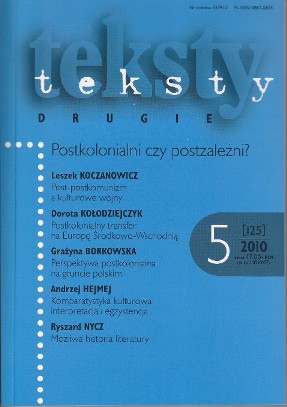Komparatystyka kulturowa: interpretacja i egzystencja
Cultural Comparative Studies: Interpretation and Existence
Author(s): Andrzej HejmejSubject(s): Literary Texts
Published by: Instytut Badań Literackich Polskiej Akademii Nauk
Keywords: Literature; Comparative studies; Cultural Studies; Methodology
Summary/Abstract: New opportunities for pursuance of literary comparative studies, referred to these days as ‘new’/‘non-classical’/‘cultural’ comparative studies, have occurred in the last two decades, particularly after the interventions (by e.g. S. Bassnett, G.C. Spivak) claiming a ‘death’ of the discipline. The author diagnoses the condition of comparative studies in literature, stressing non-commensurability of comparative-study projects and taking into account three currents in comparative studies: traditional (19th-century heritage); interdisciplinary (interdisciplinary comparative studies existing since late 1960s/early 1970s); and, cultural (cultural comparative studies developed since late 1980s/early 1990s). Regardless of how one may approach the enormous tradition of comparative studies, departure from what once was ethno-/euro-centrism appears to be the distinguishing mark of the new paradigm: cultural comparative studies. The author argues in the first place that cultural comparative studies – being a modern form of literary studies – are a nomadic discipline. The suggestion is that the modern comparative studies be approached not as a constantly extending domain of issues and limitless expansion, but rather as an effect of thinking which enables us in today’s world – if Armando Gnisci’s metaphor is acceptable here – to ‘decolonise ourselves’; as an interpretative practice deeply founded in daily existence.
Journal: Teksty Drugie
- Issue Year: 2010
- Issue No: 5
- Page Range: 53-64
- Page Count: 12
- Language: Polish

